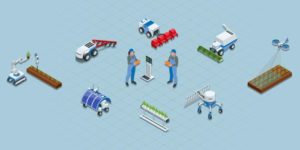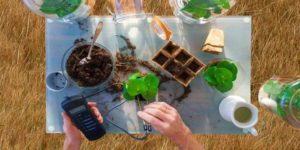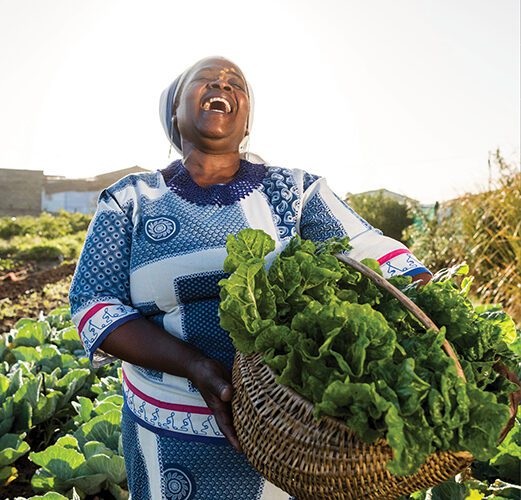While the scientific community has begun to view old fears about overpopulation as unfounded, the rapidly expanding human population presents very real challenges to economic, agricultural, and communal infrastructures. In the agriculture industry, farmers face an ever-growing demand to produce more food, even as they struggle to protect their farms against extreme weather, climate change, environmental impact, and more.
To meet the increasing needs of a growing population and get the most yield from their farms, growers are turning to new technology powered by the Internet of Things (IoT). New “smart farming” applications, based on IoT technologies, will enable the agriculture industry to reduce waste and enhance productivity.
Precision Farming Through Resource Optimization
IoT-enabled precision agriculture techniques give farmers effective tools to optimize every farming task. These technology-driven practices are focused on increasing crop yields and profitability while lowering the levels of traditional inputs (water, fertilizer, insecticides, and herbicides) that are needed to grow crops. Essentially, smart farming uses less to grow more.
For example, GPS devices on tractors enable farmers to plant crops in more efficient patterns and optimize travel over and between their fields, saving time and fuel. Sensors installed on farming equipment can also collect data related to the weather, soil, pest, or hydration conditions, then send that data to a centralized smart farm platform to analyze and make predictive farming decisions. Fields can be leveled by IoT-controlled lasers so that water can be applied more efficiently and with less liquid waste running off into local streams and rivers.
When the time comes to spray fields with crop protection products, automated drones can be used in place of crop dusters to reduce costs and remove the safety risk of manned aircraft flying at high speeds so close to the ground. While flying, crop dusting drones can also take continuous photos and video of fields so that farmers can monitor plant health without sending out scouts.
The result of these precision agriculture farming methods represents a boon for farmers in terms of resource use and effectiveness and holds great potential for making agriculture more sustainable, increasing food availability.
How CropMetrics Uses Smart Farming to Optimize Field Irrigation
CropMetrics, a precision irrigation company founded by farmers in 2009, has developed a smart farming solution that enables growers to effectively manage the irrigation of their crops. They begin by identifying the variability of a field using metrics such as soil type, texture, topography, slope, and yield. These metrics, combined with the farmer’s consultative insights, enable CropMetrics to determine what each field needs to achieve effective irrigation. They then install a soil moisture probe in the optimal field location. The probe is fitted with sensors that send data to CropMetrics’s platform in real-time, which drives irrigation scheduling.
CropMetrics’s system executes crop modeling and weather data through a proprietary system that is designed to provide efficient, data-driven recommendations for irrigating crops. With these tools, farmers can create a custom irrigation plan that looks several days ahead, predicting exactly how much irrigation will be needed and where the water needs to go.
Aeris Provides Unparalleled Connectivity
It remains to be seen if precision agriculture and smart farming technologies will enable food production to keep up with the growing population, but current practices and research are showing promise. With more work on field optimization and reducing the amount of resources that are required to produce food, the agriculture industry could significantly increase food availability within the next two decades.
At Aeris, we provide the connectivity solutions that are the backbone of smart farming technology. Our IoT infrastructure gives precision agriculture companies the technology to transform unconnected products into connected devices that generate and analyze important information. With the Aeris Intelligent IoT Network, all agricultural data can be organized and interpreted to achieve optimal resource utilization and efficiency at any field, anywhere in the world.
To learn more about IoT technology and how it can enable smart farming solutions, contact Aeris today.




